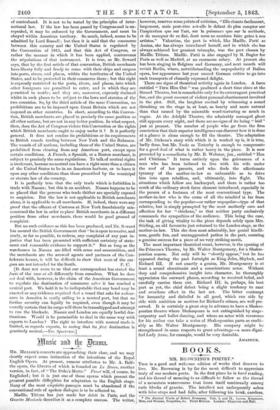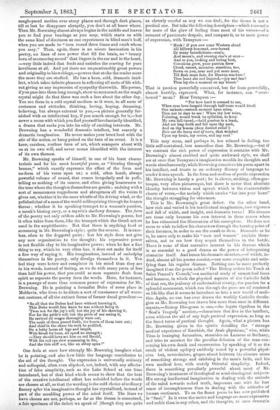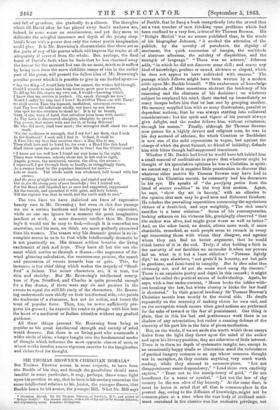BOOKS.
MR. BROWNING'S POETRY.*
Tam is a good and welcome edition of works that deserve to live. Mr. Browning is by far the most difficult to appreciate truly of our modern poets. In the first place he is hard reading, and his thread of meaning is as difficult to follow as the thread of a mountain watercourse that loses itself continually among rude blocks of granite. The intellect not unfrequently aches with false steps and bad falls, after following his brisk, careless, • The Baikal Works of Robert Browning. vol.. L and H., Lyrics, Romances, Men, and Women, Tragedies, &c. Third Edition. London: Chapman and Hall. rough-paced motion over stony places and through dark places, till at last he disappears abruptly, you don't at all know where. Then Mr. Browning almost always begins in the middle and leaves you to find your bearings as you may, which starts us with the same kind of dizziness as one experiences in blind man's buff, when you are made to " turn round three times and catch whom you may." Then, again, there is no minute fascination in his poetry, no lines of rare power that fill the brain, no " beauty born of murmuring sound" that lingers iu the ear and in the heart, —very little indeed that feeds and satisfies the craving for pure loveliness at all. And yet there are unquestionably great powers and originalityin his writings,—powers that strike the reader more the more they are studied. He has a keen, cold, dramatic intel- lect, which takes infinite pleasure in reflecting all sorts of life with- out giving us any impression of sympathy therewith. His poems, if you gaze into them long enough, show us men much as the magic crystal might do that there was such a fuss about the other day. You see them in a cold crystal medium as it were, in all sorts of costumes and attitudes, thinking, loving, hoping, dreaming, believing, but always external to you,—a picture generally fur- nished with an intellectual key, if you search enough for it,—but never a scene with which you find yourself involuntarily identified, a drama that sucks you into its eddy of exciting interests. Mr. Browning has a wonderful dramatic intellect, but scarcely a dramatic imagination. ' He never makes your heart beat with the stir of the action, or bang poised on the turn of an event. It is a keen, careless, restless form of 'art, which scampers about with us at its own will, and never seems identified with the interest of its own themes.
Mr. Browning speaks of himself, in one of his least charac- teristic and far his most beautiful poem, as " blowing through bronze," which exactly expresses the effect of the form and no-form of his verse upon us ; a cold, often harsh, always powerful volume of sound, that comes irregularly and in puffs, telling us nothing of its source, and often giving hoarseness to the tone where the thoughts themselves are gentle ; enduing with a sort of monotonous ruggedness and abruptness all the voices it gives out, whether it be the mere whistle of the driving wind, or the polished chat of a man of the world soliloquizing through its brazen throat ; whether it be speaking-trumpet to a woman's passion, a monk's hissing envy, or a mystic's shadowy dreams. The form of the poetry not only seldom adds to Mr. Browning's poems, but it often takes from them, like the trumpet which the Greek actors used in the amphitheatre. Not that there is anything loud or screaming in Mr. Browning's style ; quite the reverse. It is care- less, often to the doggerel point ; but his style does not give any new organization to the thought ; his expressive power is not flexible clay to his imaginative power; when he has a fine thing to say, which he very often has, it does not make for itself a fine way of saying it. His imaginations, instead of embodying themselves in his poetry, only divulge themselves in it. You feel they were better and completer in his mind than they are in his words, instead of feeling, as we do with many poets of less than half his power, that you could as soon separate flesh from spirit as separate the poetry from the words. Here, for instance, is a passage of more than common power of expression for Mr. Browning. He is painting a formalist Duke of some place in Moldavia, who lives to institute a sort of renaissance of all worn- out customs, of all the extinct forms of former ducal grandeur :— " So all that the Dukes had been without knowing it,
This Duke would fain know he was without being it.
'Twas not for the joy's self, but the joy of his showing it, Nor for the pride's self, but the pride of our seeing it, He revived all usages thoroughly worn out, The souls of them passed forth, the hearts of them torn out; And chief in the chase his neck he perilled, On a lathy horse all legs and length, With blood for bone, all speed no strength; —They should have set hint on red Berold, With the red eye slow consuming in fire, And the thin stiff ear, like an abbey spire!"
One feels at once how strongly Mr. Browning imagines what he is painting, and also how little the language contributes to the aid of the thought. The expression is universally ordinary and colloquial, often even slipshod, not, indeed, with any affecta- tion of false simplicity, such as the Lake School at one time introduced, but of that kind which seems to show that the heat of the creative intellectual effort has subsided before the words are chosen at all, so that the wording is the cold choice of ordinary fluency after the imaginative thought has crystallized, instead of part of the moulding power of the mind itself. The lines we have chosen are not, perhaps, as far as the theme is concerned, a fair specimen of the defect we speak of (though they are quite
as cleverly worded as any we can find), for the theme is not a poetical one. But take the following description—which transmits far more of the glow of feeling than most of his verses—of a moment of passionate despair, and compare it, as to mere power of expression, with Tennyson :- "Hush I if you saw some Western cloud All billowy-bosomed, over-bowed By many benedictions—sun's,
Aud moon's, and evening star's at once— And so you, looking and loving best, Conscious grew, your passion drew Cloud, sunset, moonrise, starahine, too, Down on you, near and yet more near, Till flesh must fade, for Heaven was here! Thus leant she and lingered,—joy and fear! Thus lay she a moment on my breast."
That is passion powerfully conceived, but far from powerfully, almost harshly, expressed. What, for instance, can " over- bowed" mean? Hear Tennyson :—
"For how hard it seemed to me,
When eyes love-languid through half-tears would dwell One earnest—earnest moment upon mine, Then not to dare to see ! When thy low voice, Faltering, would break its syllables, to keep My own full-tuned,—hold passion in a leash, And not leap forth and fall upon thy neck, And on thy bosom (deep desired relief !)
Rain out the heavy mist of tears, that weighed
Upon my brain, my senses, and my soul."
This may seem, and perhaps is, too relaxed in feeling, too little self-contained, less masculine than Mr. Browning,—but if we contrast the rich power of expression it contains with Mr. Browning's almost crabbed and quite awkward style, we shall see at once that Tennyson's imagination moulds its thoughts and words simultaneously, while Browning conceives his poem apart in his intellect, and trusts to an ordinary fluency of language to render it into speech. In the form and medium of poetic expression Mr. Browning is barely a poet ; he is clever, striking, often gro- tesque, very often picturesque, but there is never that absolute identity between vision and speech which is the characteristic charm of verse,—the melody which carries "far into your heart" the thought struggling for utterance.
This is Mr. Browning's great defect. On the other hand, how rich and varied is his intellectual imagination, how vigorous and full of width, and insight, and dramatic turns ! His dramas are tame only because his own interest in them ceases when he has exhausted the illustration of his conception. He does not seem to wish to follow his characters through the turning point of their fortunes, in order to see the result to them, Dramatic as he is, he cares only to make his "men and women" explain them- selves, not to see how they acquit themselves in the battle. There is none of that narrative interest in his dramas which is as essential to a good drama as the power of interpreting character itself. And hence his dramatic sketches,—of which, in- deed, almost all his poems consist,—are more complete and satis- fying than his regular dramas. Nothing can be more perfectly imagined than the poem called "The Bishop orders his Tomb at Saint Praxed's Church,"—a mediaeval study of unmatched force and humour, in which the physical aspects of the Catholic faith of that era, the jealousy of ecclesiastical rivalry, the passion for a splendid monument, which run through the piece are all rendered so life-like that it seems to introduce us into a new world of reali- ties. Again, no one has ever drawn the worldly Catholic theolo- gian as Mr. Browning has drawn him more than once in different aspects,—Bishop Blougram is one,—the legate Ogniben in the " Soul's Tragedy" another,—characters that live in the intellect, even without the aid of any high poetical expression, as long as the finest turns of poetical thought. Again, what a picture has Mr, Browning given in the epistle detailing the " strange medical experience of Karshish, the Arab physician," who, while Titus is besieging Jerusalem, stumbles on Lazarus at Bethany, and tries to account for the peculiar delusion of the man con- cerning his own death and resurrection by speaking of it as the result of violent epilepsy suddenly cured by a powerful physi- cian but, nevertheless, gropes about between his obscure sense of something strange and subduing in the man's faith, and his own medical lore, with stately Oriental simplicity. Indeed, there is something peculiarly powerful about most of Mr. Browning's treatment of theological or semi-theological subjects. His strong intellectual imagination in dealing with the attitude of the mind towards naked truth, impresses one with far less sense of incompleteness than in dealing with the attitudes of human sentiment. To us the finest poem he has ever published is " Saul." In it even the metre and language are more expressive and noble than in any other, and the thoughts, at once dramatic
and full of grandeur, rise gradually to a climax. The thoughts which fill David after he has played away Saul's madness are, indeed, in soma souse an anachronism, and yet they seem to delineate the mingled innocence and depth of the young shep- herd's heart with a power that only the rarest poetic imagination could give. It is Mr. Browning's characteristic that there are so few parts of any of his poems which will impress the reader at all adequately if severed from the whole. But, perhaps, the final burst of David's faith when he finds that he has charmed away the horror for the moment but can do no more, much as it suffers by being torn from the more childlike image of him in the earlier part of the poem, will present the fullest idea of Mr. Browning's peculiar power which it is possible to give in our limited space:-
" See the King—I would help him but cannot, the wishes fall through.
Could I wrestle to raise him from sorrow, grow poor to enrich, To fill up his life, starve my own out, I would—knowing which, I know that my service is perfect. Oh, speak through me now! Would I suffer for him that I love ? So woulast Thou—so wilt Thou!
So shall crown Thee the topmost, ineffablest, uttermost crown—
And Thy love fill infinitude wholly, nor leave up nor down One spot for the creature to stand in! It is by no breath, Turn of eye, wave of hand, that salvation joins issue with death !
As Thy Love is discovered almighty, almighty be proved
Thy power, that exists with and for it, of being Beloved !
He who did most, shall bear most; the strongest shall stand the most weak.
'Tie the weakness in strength, that I cry for ! my flesh, that I seek In the Godhead ! I seek and I find it. 0 Saul, it shall be A Face like my face that receives thee; a Man like to me, Thou shalt love and be loved by, for ever ; a Hand like this hand Shall throw open the gates of new life to thee ! See the Christ stand !
"I know not too well how I found my way home in the night.
There were witnesses, cohorts about me, to left and to right,
Angels, powers, the unuttered, unseen, the alive, the aware—
I repressed, I got through them as hardly, as strugglingly there,
As a runner beset by the populace famished for news—
Life or death. The whole earth was awakened, hell loosed with her
crews ;
And the stars of night beat with emotion, and tingled and shot Out in fire the strong pain of pent knowledge; but I fainted not, For the Hand still impelled me at once and supported, suppressed All the tumult, and quenched it with quiet, and holy behest, Till the rapture was shut in itself, and the earth sank to rest."
The two lines we have italicized are lines of expressive beauty rare in Mr. Browning ; but even in this fine passage we see a certain hardness and inadequacy in the expression, while no one can ignore for a moment the great imaginative intellect at work. A more dramatic intellect than Mr. Brown ing's it would not be easy to find,—though it is somewhat too masculine, and his men, we think, are more perfectly conceived than his women. The reason why his dramatic genius is so in- complete seems to us to be that while intellectually dramatic he is not practically so. His dramas seldom breathe the living excitement of risk and hope. They have all but the one ele-
ment which carries us through a drama,—the eagerness of for- ward glancing calculation, the venturesome passion, the march and procession of events towards loss or gain. This, for instance, is the chief thing which makes the tragedy of "Straf- ford" a failure. The minor characters are, it is true, too
thin and sketchy. But Mr. Browning's intellectual concep- tion of Pym, Strafford, and Charles is quite powerful enough for a fine drama, if there were .any vis and passion in the events to equal the still-life study of the characters. Mr. Brown- ing understands men chiefly on their intellectual side,—he paints the tendencies of a character, but not its action, and hence the want of popular force. Then, too, he never sufficiently pre-
pares his ground ; he expects his reader to plunge with him into the heart of a mediteval or Italian situation without any gradual guidance.
All these things prevent Mr. Browning from being as popular as his great intellectual strength and variety of mind would deserve. But there is no living poet who commands a wider circle of ideas, a larger insight into the fundamental modes of thought which influence the most opposite classes of men, or whose works involve a more vigorous exercise to the imagination and richer food for thought.
































 Previous page
Previous page